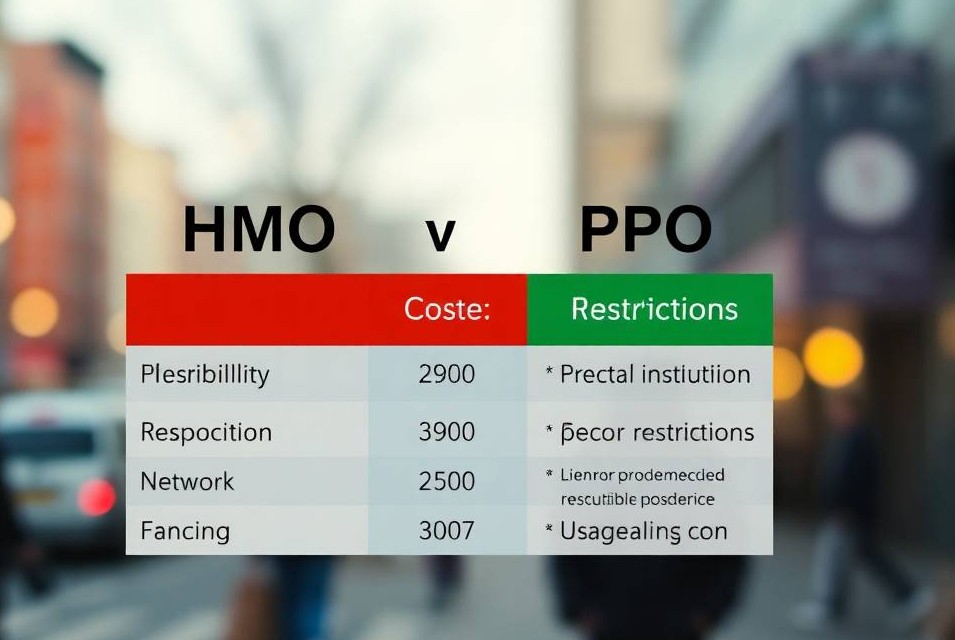Learn the key differences between HMO and PPO health insurance plans, their pros, cons, and how to choose the best one for your needs and budget.
Choosing the right health insurance plan can be overwhelming, especially when faced with terms like HMO and PPO. These are two of the most common types of health insurance plans, each with different rules, costs, and levels of flexibility. Understanding their differences is crucial because the right plan can help you save money, get the care you need faster, and avoid unexpected bills.
This article will discuss how HMO and PPO plans work, compare their pros and cons, and help you decide which type is best for your lifestyle, health needs, and budget. Whether you’re buying insurance for yourself, your family, or your small business, this guide will make the decision process much easier.
What Is an HMO (Health Maintenance Organization)?
An HMO (Health Maintenance Organization) is a type of health insurance plan offering lower costs but with strict rules about how you receive care. With an HMO, you must choose a Primary Care Physician (PCP) who manages your healthcare. To see a specialist, you must first get a referral from your PCP. HMO plans only cover in-network providers, meaning you must use doctors and hospitals within the plan’s network unless it’s an emergency. These plans typically have lower monthly premiums and out-of-pocket costs, making them a good choice for individuals or families on a tight budget. However, they provide less flexibility when choosing doctors or specialists.
What Is a PPO (Preferred Provider Organization)?

A PPO (Preferred Provider Organization) is a more flexible health insurance plan that allows you to see any doctor, even if they’re out-of-network. Unlike an HMO, you don’t need a Primary Care Physician (PCP) or a referral to see a specialist. PPO plans allow you to choose healthcare providers at your convenience, which is great for those needing specialized care or who prefer more control over their healthcare decisions.
However, PPO plans typically come with higher premiums and out-of-pocket costs. While you’ll pay more for the flexibility, the plan offers greater freedom in choosing doctors and hospitals, making it a preferred choice for many people with complex or frequent healthcare needs.
Key Differences Between HMO and PPO
When comparing HMO and PPO health insurance plans, the biggest difference is flexibility. HMOS requires you to choose a Primary Care Physician (PCP) who manages your care, and you need a referral to see a specialist. Additionally, you must stick to an in-network provider unless it’s an emergency. While this leads to lower monthly premiums and predictable costs, it restricts your freedom in choosing healthcare providers. On the other hand, PPOS allows you to see any doctor, even outside the network, without needing a referral, offering much more flexibility.
However, the cost of PPO plans is usually higher, both in premiums and out-of-pocket expenses. An HMO may be best if you prioritize lower costs and don’t mind restrictions. If you need more control over your healthcare and don’t mind paying extra, a PPO might be the right choice.
Pros and Cons of HMO Plans
Pros:
One of the main advantages of an HMO plan is the lower monthly premiums, making it a more budget-friendly option. With a Primary Care Physician (PCP) managing your care, you benefit from coordinated, preventive healthcare, which helps catch potential issues early. Since the plan only covers in-network providers, your costs are typically more predictable, with fewer unexpected medical bills.
Cons:
On the downside, HMO plans have limited flexibility. You can only see doctors within the network; if you need a specialist, you must first get a referral from your PCP. This can slow down your access to care, especially if you need specialized treatment. Additionally, there’s less freedom of choice when it comes to healthcare providers.
Pros and Cons of PPO Plans
Pros:
A major advantage of a PPO plan is the freedom to see any healthcare provider without needing a referral. This makes it a great option if you need to see specialists or prefer to choose your doctors independently. PPOs also offer coverage for out-of-network care, ideal for those who travel frequently or have specific medical needs not covered within the network. While these plans are typically more expensive, they provide more flexibility in choosing providers and seeking care when and where needed.
Cons:
However, this flexibility comes with a price—PPO plans generally have higher premiums and out-of-pocket costs. You’ll also need to manage more paperwork when seeing out-of-network providers. The higher cost may not be worth it for those who don’t need extensive or specialized care.
HMO vs PPO: Which One Should You Choose?

Choosing between an HMO and a PPO plan depends on your budget, healthcare needs, and preference for flexibility. If you want to save money and don’t mind having a Primary Care Physician (PCP) manage your care, an HMO is a great choice. It’s ideal for individuals or families on a tight budget who don’t need frequent specialist visits. However, if you prioritize freedom and flexibility in choosing doctors or you have complex healthcare needs, a PPO may be a better option. It’s also a good choice if you travel often or need access to out-of-network providers. Ultimately, consider your health needs, lifestyle, and how much you’re willing to spend on premiums before deciding.
Real-Life Scenarios
Sarah’s Story
Sarah is a young professional with a limited budget. She needs regular check-ups and prefers a straightforward healthcare process. After reviewing her options, Sarah chose an HMO plan. She selected a primary care physician (PCP) and found that the lower premiums fit her budget. Although Sarah can only see specialists with a referral, the cost savings made this trade-off worthwhile.
Mike’s Case
Mike is a freelance consultant who often travels and requires specialized care. He decided on a PPO plan because it allows him to see doctors of his choice, even when he’s out of town. Mike prefers to avoid the hassle of referrals and appreciates being able to access out-of-network care when necessary. While his premiums are higher, the plan’s flexibility suits his lifestyle and health needs.
Conclusion
Choosing between an HMO and a PPO plan depends on your personal healthcare needs, lifestyle, and budget. An HMO plan is a smart option if you’re looking for affordable coverage with less flexibility. It’s ideal for those who need basic care and don’t mind working within a network of providers. On the other hand, if you value flexibility, access to a wide range of providers, and don’t mind paying higher premiums, a PPO plan could be a better choice. Whichever plan you choose, it’s essential to carefully compare the coverage, costs, and benefits to ensure it aligns with your healthcare needs. Review your options each year, as health conditions and needs may change.
FAQs
Is HMO cheaper than PPO?
Yes, HMO plans are generally cheaper than PPO plans. HMOSs have lower premiums and out-of-pocket costs, but they come with more restrictions, such as needing referrals and staying within the plan’s network.
Can I switch from an HMO to a PPO?
Yes, you can switch from an HMO to a PPO during open enrollment or if you have a qualifying life event (like moving to a new location). However, switching may affect your premiums and coverage options.
Do PPO plans cover out-of-network doctors?
PPO plans cover out-of-network doctors, though you may pay higher costs for out-of-network care. It’s always best to stay within the network to save on costs.

